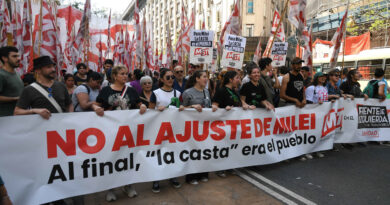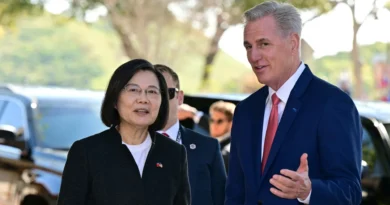COP28, a “tragedy for the planet”
DAVID SPRATT AND IAN DUNLOP
Up to 100.000 people - most of whom derive their professional status and income from politics, defense and climate-related businesses - flew to Dubai to attend COP28, the Conference of the Parties to the United Nations Convention United Nations on Climate Change. And the result?
An unmitigated disaster. Indigenous peoples, frontline communities and climate justice groups called the deal unfair, unequal and “business as usual.” In the final session, a weak and incoherent compromise resolution between oil-producing countries and smaller states and climate advocates - which did not call for the phasing out of fossil fuels - was accepted without dissent and greeted with a standing ovation from complacent foot, even when delegates from the Pacific and small islands were prohibited from entering the room for security reasons.
Too many simplistic responses were variations on the mix of “we are moving in the right direction, but more needs to be done,” with the classic “flawed but transformative” example. Two days later, the COP28 president, who also heads the Abu Dhabi National Oil Company, announced that the United Arab Emirates would maintain its record investment in new oil production.
Professor Kevin Anderson, of the University of Manchester, described the scene as “the infinite loop of COP Groundhog Days”. It seemed that the Stockholm syndrome had once again taken hold of the delegates, hostage for decades to the denialist and dilatory tactics of the fossil fuel producers and the threat of veto from their governments, who cheered for a result that will bring the societies of the whole world to civilizational collapse.
This cognitive dissonance is the cultural norm of COPs. Everything revolves around a performative result, regardless of its effectiveness. Despite dozens of such “successes” over three decades, global emissions continue to rise. Politics is based on incrementalism, compromises, agreements and “pragmatic realism”, which assumes that the laws of nature can be negotiated and an existential risk can be mitigated with that behavior. Avoiding climate risk, the supposed raison d'être of the COPs, is neither discussed nor understood by the main negotiators.
Many people with a career in climate policy will celebrate any outcome, because to do otherwise would be to admit the systemic failure of the COPs, and risk their own professional future.
But many “outside the tent” in Dubai – the scientists, the most vulnerable states, the young activists and civil society organizations with some guts – did not celebrate; They cried for the future of humanity. Kevin Anderson summed it up this way: “No doubt there will be a lot of cheering and back-slapping… but physics won't care.”
There were two big issues on the agenda: the reduction to zero of emissions, mainly from fossil fuels, and financing. Regarding the first, national delegates agreed on the “transition away from fossil fuels”, but no words appeared on the “phasing out” of oil, coal and gas advocated by civil society and 130 of the 198 countries. participants.
Still, there were many get-out-of-jail letters. The most important was the acceleration of carbon capture and storage, which the fossil fuel industry says will allow oil, gas and coal to be produced indefinitely, except that the technology does not work at scale. Then there is the acceptance of “efficient” fossil fuel subsidies, and the language around the need for an “orderly” transition that is now impossible largely as a result of the fossil fuel industry's denialism over many decades.
Climate finance is essential, especially for developing and most vulnerable nations, through the Green Climate Fund, and a Loss and Damage fund that recognizes the historical responsibility of highly polluting nations for the damage inflicted on those least fortunate. have contributed to the problem, but have disproportionately borne the impacts. Small island states called national commitments to these funds to date trivial and disappointing, and Australia's refusal to support a funding mechanism for loss and damage a “deep betrayal and abdication of its responsibilities to its Pacific neighbors.” .
Scientists expressed their anger and condemnation. They know that, after COP 28, both the level of greenhouse gases and coal use will reach a record level in 2023. And they have documented the growing emissions and production gap between the promises and actions of nations and the plans of the largest producers of fossil fuels to continue expanding production, which the COP has done practically nothing to prevent.
Michael Mann of the University of Pennsylvania said that “the lack of an agreement to phase out fossil fuels was devastating.” Mike Berners-Lee, of Lancaster University, called COP28 “a dream outcome for the fossil fuel industry, because it looks like progress, but it is not.” Martin Siegert, of the University of Exeter, said that not making a clear statement to stop burning fossil fuels “is a tragedy for the planet and our future.” "The world is warming faster and stronger than the COP's response to it." And Dr. Friederike Otto, of Imperial College London: “With every vague verb, every empty promise in the final text, millions more people will enter the front lines of climate change and many will die.”
Scientists and policymakers seem to live in parallel worlds, and in a sense they do. The COPs, which claim to be informed by IPCC reports, rely disproportionately on emissions reduction scenarios generated by Integrated Assessment Models (IEMs), which incorporate energy, economics and a reluctant analysis of climate impacts. The MEIs reflect more the social, technological and economic visions of the modellers than the physical realities. They have now been convincingly debunked in recent reports and analyses.
Such models produce absurd proposals on the compatibility of “net zero 2050” with the Paris goal of limiting warming to 1,5-2°C, which have become the bread and butter of the COPs. In fact, this year it will be close to 1,5 °C (with a warming of 1,46 °C until the end of November), and next year is very likely to be warmer. James Hansen, former NASA climate official, warns that “global warming of 2030°C will be reached by the end of the 2s” due to accelerating warming:
“The first six months of the current El Niño are 0,39°C warmer than the same six months of the 2015-16 El Niño, a global warming rate of 0,49°C/decade, consistent with the expectation of a large acceleration of global warming. We hope that the 12-month average temperature in May 2024 will remove any doubt about the acceleration of global warming. The subsequent 12-month temperature drop below 1,5°C will likely be limited, confirming that the 1,5°C limit has already been exceeded.”
This should have been the main concern of the COP28 results, but it was never mentioned. Nor was there any mention of the increasingly dire warnings that major turning points are already underway. Faster than anticipated, climate impacts are triggering a cascade of tipping points in the Earth system. And it turned a blind eye to warnings from Stockholm University's David Armstrong McKay and his colleagues that even 1°C global warming could trigger some tipping points.
Privately, some eminent scientists fear that we are heading towards 4°C warming – truly existential, considering the high-level risks that are emerging. “Could anthropogenic climate change lead to the collapse of global society or even the extinction of humanity? At present, this is a dangerously underexplored topic…yet there is every reason to suspect that climate change could lead to a global catastrophe,” eminent Australian scientist Will Steffen and his colleagues wrote in August 2022.
Nothing in this COP has substantially moved us away from that trajectory. In fact, by fostering the illusion that “orderly” solutions are still possible, in the face of the need for disruptive mobilization on an emergency scale, it has made things worse.











You can look for another angle. If there is less demand there will be less production of oil and everything that is produced with oil and everything that pollutes. Without reducing demand it will be impossible to stop production. I mean, we have to lower the population level and SERIOUSLY. If that is not done, there will be no solution no matter how many meetings they hold. Set a maximum number of children and that's it. He who does not comply… GROSS FINE. AND TO THE POOR A SON, PERIOD. IF NECESSARY, WOMEN WILL BE OPERATED. I suppose that the imposed fashion of sex change and homosexuality is already going that way